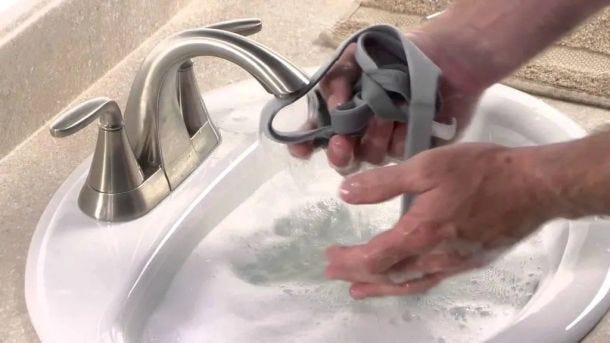How To Clean Your CPAP Mask & Hose
Cleaning Your CPAP Mask and Hose
An essential part of your CPAP therapy is maintaining your CPAP equipment. Keep a regular cleaning and replacement schedule to ensure your CPAP machine and accessories continue performing properly.
Importance of Cleaning CPAP Mask and Hose
Just like other household items, CPAP machines and their accessories are susceptible to germs. CPAP humidifiers, for example, are a breeding ground for germs, bacteria and mold due to their warm, moist environment. Improper cleaning or maintenance of CPAP accessories can lead to inhaling these germs and ultimately, sickness.
How Often Should A CPAP Mask or Tube Be Cleaned?
Your CPAP mask should be cleaned daily. There are multiple methods of cleaning your CPAP mask, detailed below. Tubes should also be cleaned daily. Simply agitate your tube in a sink or basin full of warm, soapy water and let dry completely prior to using.
CPAP Mask Cleaning Instructions
- Fill a basin with soapy, warm water. You can also add some vinegar for good measure.
- Submerge your mask and tubing in the basin for about 5 minutes. Actively wash them.
- Rinse the parts with clean water to remove soap and let everything air dry completely before reassembly.
CPAP Mask Cleaning Wipes
CPAP cleaning wipes are another useful tool for quick, effective cleaning. Use one wipe daily to remove any residue or facial oil build-up on your CPAP cushion. Here are some options for cleaning wipes:
Citrus II CPAP Mask Cleaning Wipes
These all-natural CPAP cleaning wipes gently remove dirt, oils and organic matter from your CPAP mask and tubing. Plus, they have a refreshing citrus fragrance.
Professional CPAP Mask Wipes
These professional CPAP mask wipes are 100% pure cotton and have been developed with an all-natural cleansing formula. These wipes are unscented.
CPAP Mask Cleaning Machine
CPAP mask cleaning machines, also known as CPAP sanitizers, are the most convenient cleaning solution. No chemicals or water are needed with these fast cleaning and sanitizing systems.
SoClean 2 CPAP Cleaner and Sanitizer
The SoClean 2 CPAP Cleaner and Sanitizer destroys 99.9% of bacteria, viruses, and mold. No disassembly is required. Just place your mask and hose in the sanitizer, connect it to your CPAP machine, and let SoClean do the work.
3B Lumin CPAP Sanitizer
One touch of a button and 5 minutes is all it takes to kill the harmful bacteria that can build up in your CPAP mask and accessories. Using UV light, the 3B Lumin CPAP Sanitizer completely destroys all germs naturally.
Sleep8 CPAP Sanitizer
The Sleep8 CPAP Sanitizer offers a travel-friendly option for keeping your mask and hose clean. This compact unit kills more than 99% of bacteria that can grow in your CPAP equipment.
SoClean2 Vs. Lumin Vs. Sleep8
If you aren't sure which sanitizer option is best for you, be sure to check out our review of all three machines, so you can learn the pros and cons of each!
Cleaning a CPAP Mask and Hose with Vinegar
If you choose to clean your mask and hose by hand, you can also enhance the sanitizing power of your warm water bath with a little white vinegar. Vinegar acts as a natural sanitizer so you don’t need to use harsh chemicals.
Is it Better to Clean CPAP Masks Using a CPAP Cleaning Machine or Manually?
It is important to understand the difference between cleaning and sanitizing your CPAP equipment. CPAP sanitizers are effective at killing germs and bacteria that live on your mask and hose. However, they will not remove dirt, oils, smoke, or any other lingering residue from your accessories.
It is important to implement both hand cleaning and sanitizing into your CPAP maintenance to truly get the most out of your therapy.
How to Remove Calcium Deposits from CPAP Equipment
CPAP equipment, especially humidifiers, can be prone to calcium deposits if improperly used. Be sure to only use distilled water in your CPAP humidifier. If distilled water is unavailable, hand wash your equipment after every use to prevent build-up.
If you have any additional questions about cleaning or replacing your CPAP mask or tubing, feel free to contact our knowledgeable customer care team. We can be reached at 866-414-9700 or via email at questions@thecpapshop.com.
This post was updated on February 19, 2021.




